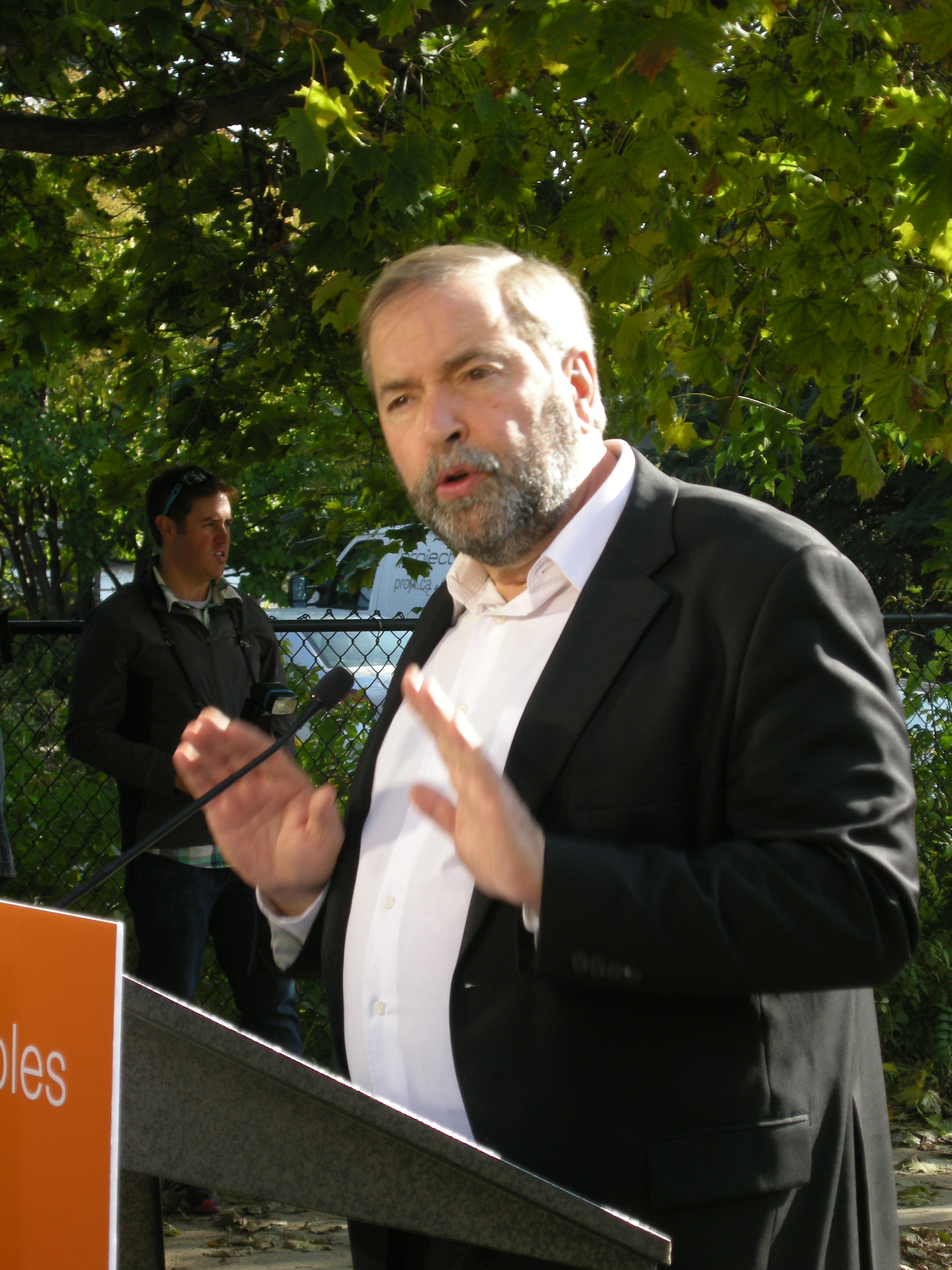Do you want to see more independent reporting from Parliament? Please chip in now to keep rabble.ca on the Hill!
NDP Leader Tom Mulcair wants to make affordable child care available to all Canadians.
He has proposed a national child care plan loosely modelled on the popular Quebec system which provides child care at $7 a day.
The NDP’s plan establishes a maximum rate of $15 per day, which amounts to about $300 per month.
When he unveiled the plan at an Ottawa day care centre on Tuesday, Mulcair talked about the huge cost of day care for many Canadian families.
“It can cost up to $2,000 a month,” he said. “I’ve met families with twins, which means they can pay up to four thousand. That’s like carrying a second mortgage.”
Child care is an area of provincial jurisdiction. The NDP’s proposal is to put federal money on the table and negotiate agreements with individual provinces, based on broad general principles
“This would not be one size fits all,” Mulcair insists. “We would work with the provinces to find solutions that best fit each of them.”
The NDP Leader unveiled an eight-year federal plan, with the aim to fund a million new day care spaces by the end of that time.
The short term goal would be 123,000 spaces after two years and 370,000 after four, in 2018-2019.
As for costs, by the fourth year the NDP foresees the federal government kicking nearly $1.9 billion into the program, 60 per cent of the total cost. The provinces would provide the other 40 per cent.
Mulcair argues vigorously that although the number looks big, that $1.9 billion would be a profitable investment.
How so?
Increased availability of child care, the NDP leader explains, would allow more women to remain in or return to the work force, which would generate increased economic activity, increased tax revenues and decreased expenditures on such programs as welfare.
To back this claim up, NDP literature cites research conducted by the TD Bank, which suggests that “for every dollar invested in early childhood education the benefits to governments through increased taxes and decreased social spending range from about $1.50 to between $2.50 and $3.00.”
Mulcair has made a point of saying that this new program would not come at the cost of other, existing federal benefits for families.
He pledges that an NDP government would not eliminate the Universal Child Care Benefit, which the Harper Conservatives introduced in lieu of the previous Liberal government’s national day care plan.
Liberals had a plan ready but then lost the 2006 election
The fact that in 2006 the NDP voted against the Paul Martin Liberal government, which had successfully negotiated a national day care plan with the provinces, engendered some political jousting on the day of the announcement.
The NDP might feel just a bit uncomfortable having once sided with Harper to give the boot to the scandal-plagued Chrétien/Martin Liberals. The Trudeau Liberals of today were quick to remind us that the NDP’s vote nine years ago ended a national child care initiative.
They issued in a news release that made that point before Mulcair had even finished speaking.
In response, the NDP rushed out its own news release.
It pointed out that the Liberals had first pledged a national day care program way back in their 1993 “Red Book” of campaign promises. The NDP reminded Canadians that it then took more than a decade for the Liberals to make a feeble effort to fulfill that promise.
The NDP news release quoted Pierre Trudeau’s one-time Principal Secretary, Tom Axworthy, who said of the Martin government’s belated 2005 program that it was a “death-bed repentance.”
Hard to lose with images of pre-school kids
If, as many pundits have already said, Mulcair’s announcement was all about political branding and getting a start on the next election campaign, it seemed to be a tactical success on this day.
The House is not sitting this week, so there is little in Ottawa competing for reporters’ attention.
Plus, the NDP event — in Ottawa’s Glebe neighbourhood, a hop-skip-and-jump from the Rideau Canal, and in the shadow of the recently re-opened football stadium — featured happy pre-school kids, and there is nothing more photogenic than that.
The one sour note was struck by Sun News’ Jessica Hume. She tried awkwardly to inject some Quebec bashing into the event.

Photo by Karl Nerenberg
“I am from Toronto,” she said to the Official Opposition Leader, “where we say we have paid for our bad roads by supporting $7 a day child care in Quebec.”
She went on to ask that if Quebec’s program, in effect, depended on federal “transfers” how could such a program be affordable for all of Canada?
It appeared that the Sun reporter had confused “transfers” with “equalization payments.” It seems she wanted to say that taxes paid by Ontarians have funded equalization, which the federal government pays to the so-called ‘have-not’ provinces (a club Ontario recently joined). This equalization, Sun’s Hume was apparently trying to assert, helped finance the Quebec day care program.
But she did not express herself clearly.
Mulcair blithely answered the actual words of the Sun News reporter’s question. He said that all provinces receive federal transfer payments (the health and social transfers, for example, which are different from equalization payments) and then reiterated that the program he was proposing could be tailored to each province’s needs.
Federal government is a fiscal winner
It took Montreal economist Pierre Fortin to utterly refute the argument the Sun News journalist had clumsily tried to make.
The NDP had brought along Fortin, a professor at the University of Quebec at Montreal, to provide added economic expertise. Fortin has studied the economic impact of child care programs and, as did the TD Bank, concluded that they yield significant net benefits, both to government revenues and to society.
On the issue of the fiscal impact of the Quebec’s $7 per day care, Fortin pointed out that the federal government does not lose, but rather benefits significantly from the program.
The federal government does not pay a cent for Quebec day care, Fortin said. Yet, because that program has allowed for significant increase in the number of women in the work force it has yielded a corresponding increase in federal income tax.
The enhanced economic activity generated by the Quebec child care program also boosts federal sales and corporate tax revenue and allows a drop in federal transfers to Quebec for social programs.
Fortin calculates that the Quebec day care program benefits the federal government by about $900 million per year, while the net fiscal benefit to Quebec’s coffers is about $400 million.
‘Parents know what’s best for their children’ — Conservatives
While the Liberals, having lashed out quickly, are now saying they’d like to take a look at the NDP plan, the Conservatives are unequivocally opposed.
On Tuesday, Harper’s folks didn’t think an NDP policy announcement was worth a whole news release. Instead, the Junior Social Development Minister, Candice Bergen, relied on the 140 character universe of Twitter to say that “Conservatives believe parents know what is best for their children,” while the NDP (it seems) “disagrees.”
If what parents believe is best for their children is affordable, regulated day care — well then, one has to assume the Conservatives believe those parents just do not know what’s good for their own children.
Mulcair plans to tour Canada to sell his day care plan.
From the tone of the first day, it is clear the NDP leader is intent on promoting national day care as an initiative that will benefit the (still limping) economy and not merely as a new and costly social program.
It will be interesting to see how the powerful economic forces in the country react to that proposition.
Whatever they — or advocates or activists or parents — might have to say, at least this promises to be a substantive policy discussion, which beats the hell out of endless analyses of opinion polls.



